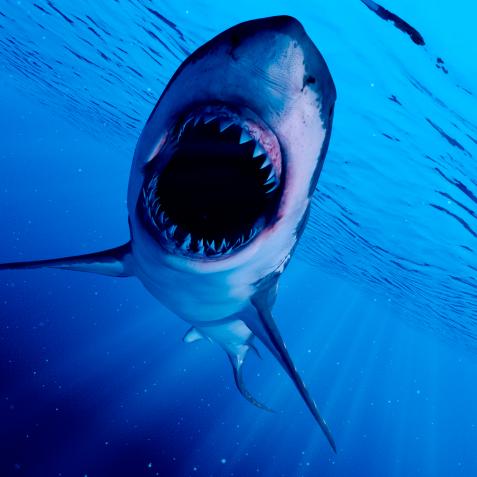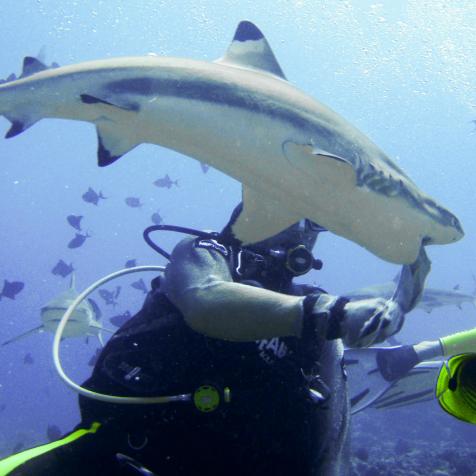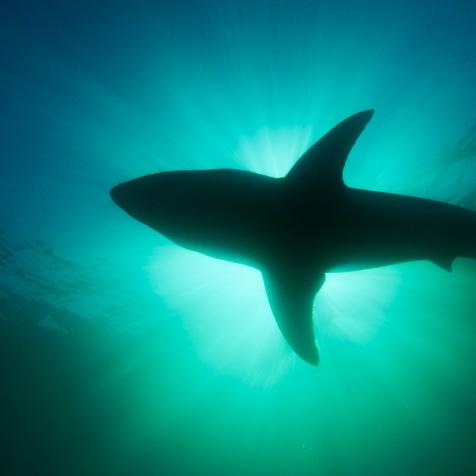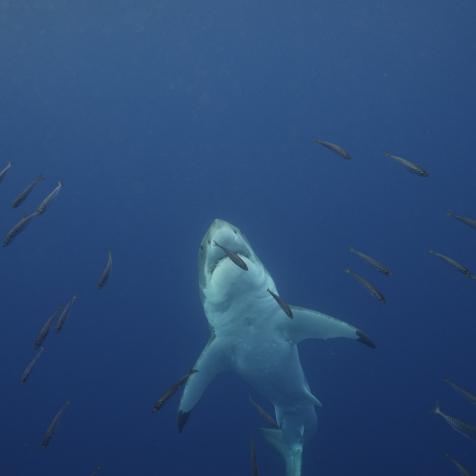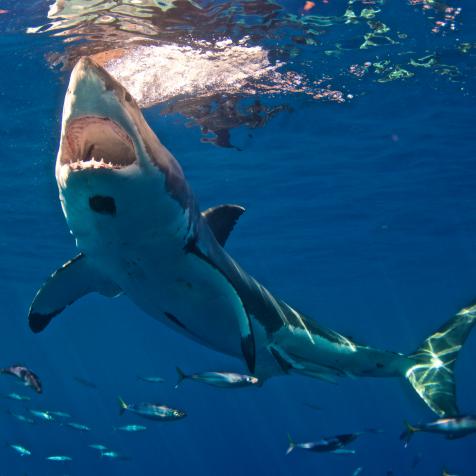
Amos Nachoum
Zen and the Art of Shark Diving
Go swimming with the sharks. From the pages of The Explorers Journal, learn how photographer Amos Nachoum finds zen to capture the ultimate apex predator on camera.
I bring my breathing down to a mere 10 pounds per minute, as my pulse settles in at a steady 54 beats per minute. Nothing outside of the present moment lingers in my mind as I focus on the totality of my surroundings. I am but 10 meters down on the seafloor, relaxing in the relative comfort of a large steel cage. I am in Shark Alley off the coast of South Africa, where I have come in the company of two fellow divers to observe the Great White on its own terms. The moment has arrived for us to abandon our protective cocoon.

Amos Nachoum
As I slowly open the gate and exit the cage, I spy a Great White, just to my right, his body scarred by seasons of spirited mating and encounters with other marine life. He glides through the water in front of me, barely noticing my presence or that of my fellow divers Andre Hartman and Phil Kohler, who like myself are heavily laden with camera gear.
My motion is fluid, my view is crystal clear, and my heart light as I focus on the shark and its graceful movements, interpreting its complex body language. For the Great White to trust me, I know I must first trust myself. Any self-doubt or apprehension is sure to compromise the mission ahead. After a passing glance, the shark comes in for a closer look. His curiosity sated, he moves on to more interesting targets.

Jeb Corliss
Amos in action.
Among the most feared predators on Earth, the Great White (Carcharodon carcharias) occupies an alpha spot—along with the Orca—at the top of the marine food chain. The sharks, which can grow to a length of 6 meters and weigh in as much as 2,200 kilograms, live in the waters off South Africa, California, and the Eastern Seaboard of the United States, Australia, New Zealand, and in the Mediterranean.
Extraordinary in its physical design, the Great White is equipped with a special “sixth sense”—a network of jelly-filled canals known as the ampullae of Lorenzini, which are linked to pores concentrated around the shark’s eyes, snout, and mouth. They enable it to detect electric fields generated by muscle contractions in other living creatures and sense their direction through electric fields ignited by ocean currents moving through Earth’s magnetic field.
The Underwater Shark Photography of Amos Nachoum 13 Photos
In partnership with The Explorers Club, Discovery gives you a look at the underwater shark photography of Amos Nachoum.
Unfortunately, films such as Jaws have skewed our view of sharks as hunters of human flesh. To acquire such footage, it has been common practice to “chum the waters” with fetid fish remains to attract and then agitate the sharks into a feeding frenzy. It may be exciting to watch but it is a misrepresentation of normal shark behavior. Contrary to popular perception, humans are not on the menu; our bodies are too bony and devoid of energy-rich fats. Most shark attacks (which average 100 a year—most non-fatal) are the result of mistaken identity or are test bites, that is, a shark taking a small sample to identify an object.
Since I first began diving with the Great White in 1982, I have come to realize that in dealing with sharks—the Great White in particular—it is all about attitude and grace, not aggression, power, or strength. Diving with this most magnificent of creatures requires an unusual pairing of heightened awareness of all things around you and a Zen-like calm and control over your own mental impulses and physical state. It is the ultimate expression of living in the moment.

Amos Nachoum
About Amos Nachoum
A Fellow of The Explorers Club since 2004, Amos Nachoum specializes in expeditions to understand Earth’s largest creatures. More on his work can be found at www.biganimals.com.
This story originally appeared in the pages of The Explorers Journal, the official quarterly of The Explorers Club since 1921. From vast ocean depths to the frontiers of outer space, The Explorers Journal offers readers first-hand reporting from those pushing the limits of knowledge and human endurance. For more stories, subscribe today.











